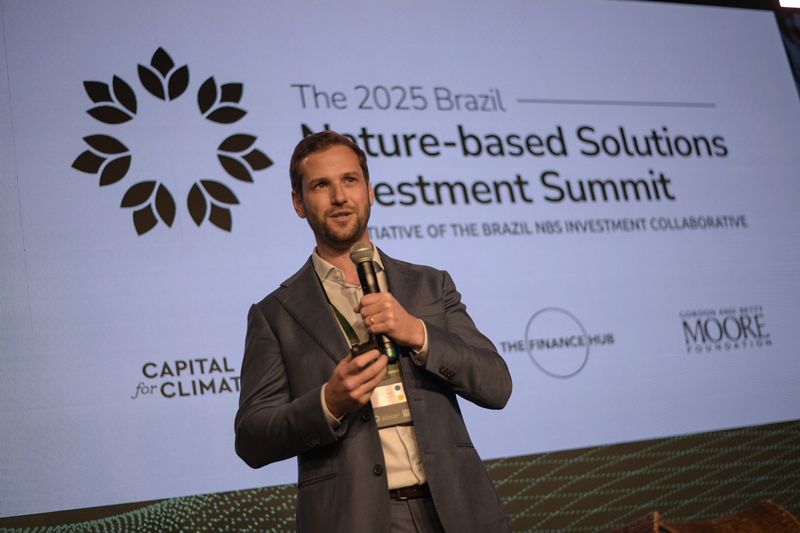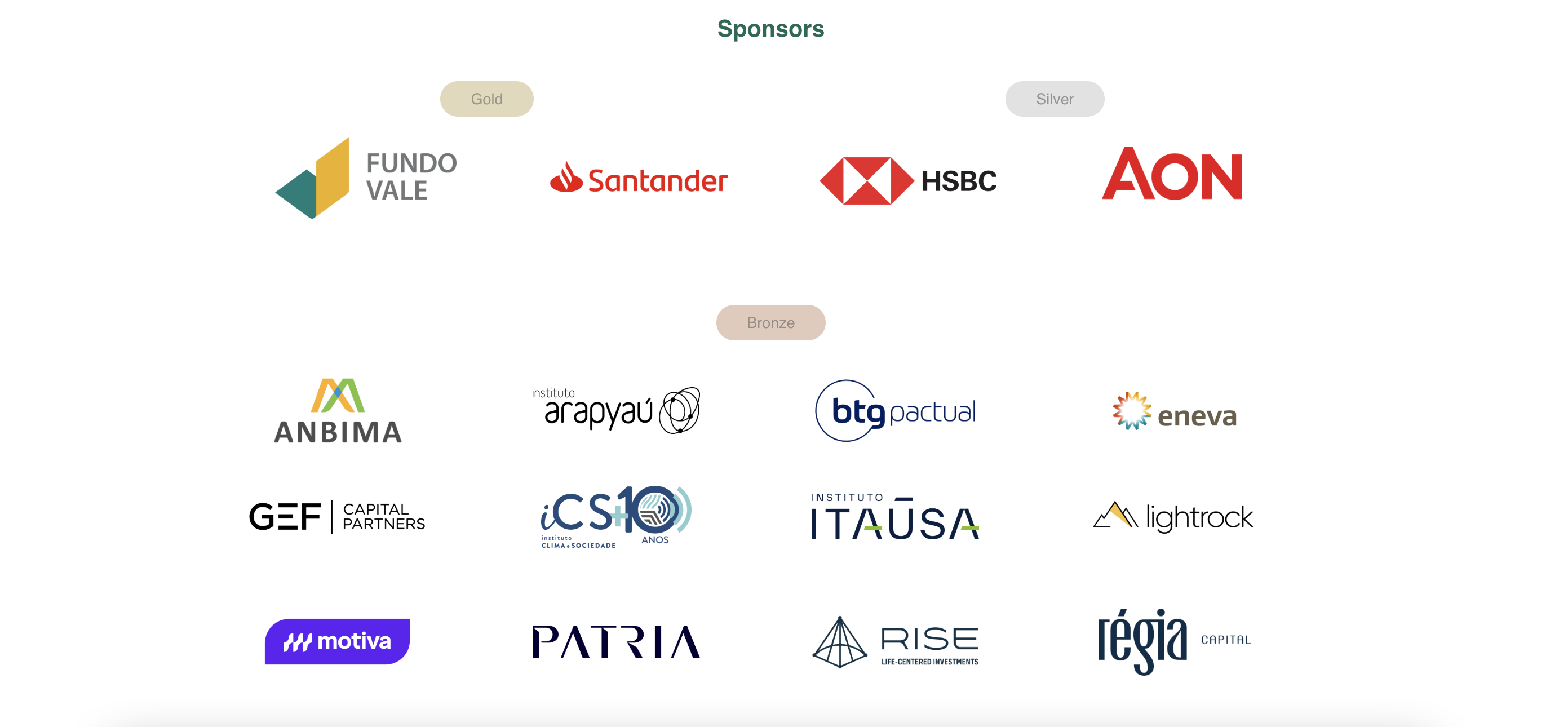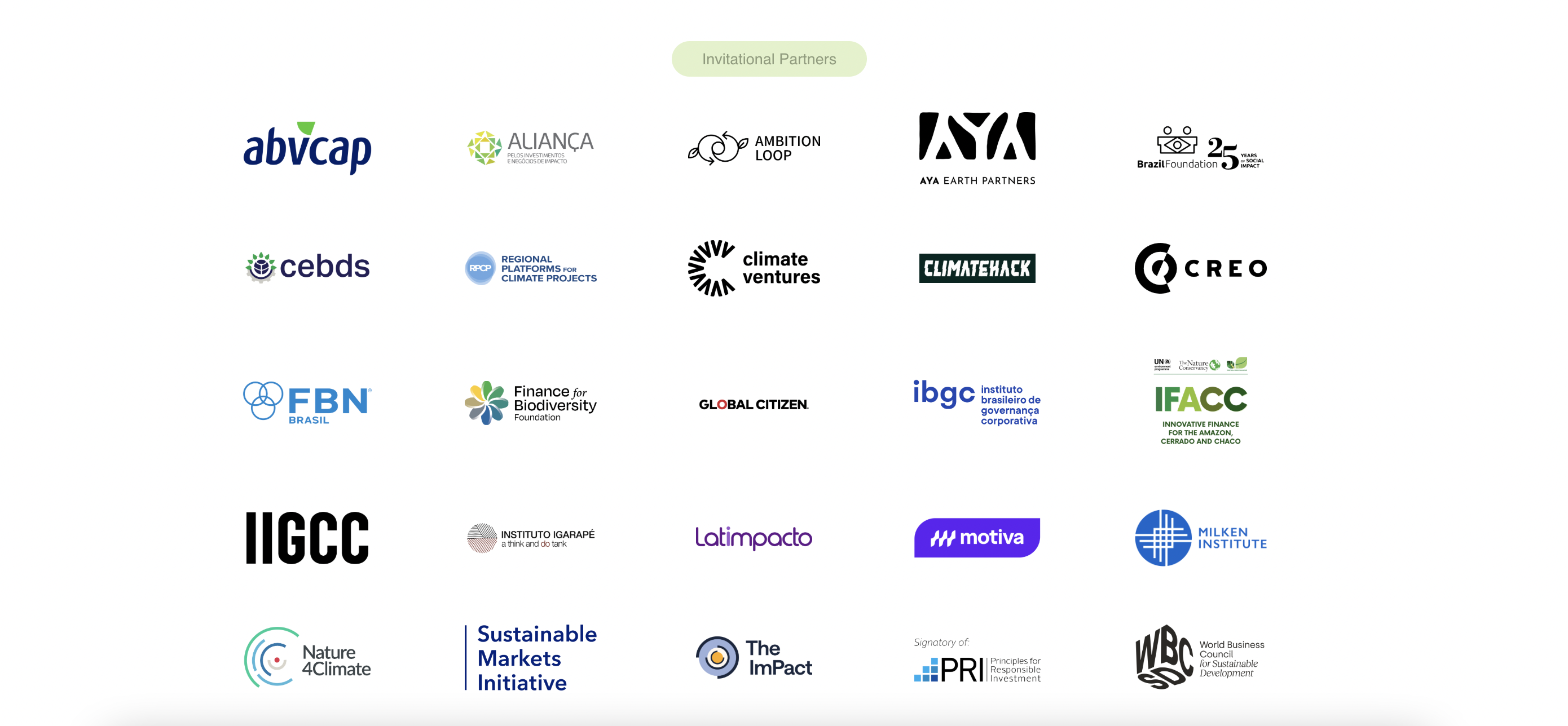2025 Brazil Nature-based Solutions Investment Summit
Brazil is taking center stage in the global climate investment landscape. The country is emerging as an environmental powerhouse, where collaborative frameworks are integrating public, private, and philanthropic capital to drive a dynamic transition toward the bioeconomy.
At this pivotal moment, halfway to COP30, we proudly hosted the third edition of the Brazil Nature-based Solutions (NbS) Investment Summit during Brazil Climate Investment Week in São Paulo, bringing together more than 300 investors, entrepreneurs, and government leaders.
“As we look back, the first year of the Summit was about education and inspiration; the second brought initial traction. In 2025, our focus is on building momentum,” said Tony Lent, co-founder of Capital for Climate, during his opening remarks on June 6, at SP Hall.
The day featured a series of panel discussions on NbS, carbon markets, scaling environmental finance, and more. Key enablers highlighted throughout the day included an increasingly favorable policy environment, risk-mitigating financial innovation, the increasing role of structured off-takes for carbon and products of regen ag and catalytic capital.
Watch the Summit Recap and read the Main Takeaways from the NbS Investment Summit below.
Policy Drivers Supporting Nature-based Solutions and the Bioeconomy
Patricia Ellen, Co-founder and Brazil Partner at Systemiq, AYA Earth Partners, moderated a discussion with Rafael Dubeux, Secretary Ecological Transformation Plan at the Ministry of Finance, and André Aquino, Head of Economic and Environment Office at the Ministry of Environment & Climate Change, on how Brazil’s Net Zero Economic Development Policies are positioning the country as a leader in the bioeconomy and NbS investment.
Rafael Dubeux emphasized Brazil’s shift from vision to action, outlining major advances, including the Compliance carbon market recently approved (and its ongoing implementation), the Ecological Transformation Plan, the BRL 4 billion in sustainable bond issuance, and the Eco Invest program to hedge currency risk for long-term investment.
“We formerly had a disbursement rate of BRL 200 million/year. Now, we are moving to BRL 10 billion/year, representing a fifty-fold increase in the amount of competitive interest rates for projects associated with the Ecological Transformation Plan", explained the Secretary.
André Aquino detailed the Tropical Forest Forever Facility (TFFF)’s goal to provide stable, per-hectare payments to forests via bond issuance and an endowment:
“This facility would seek to issue more or less US$100 billion in bonds that would pay investors back at market rates. In addition to that, it would raise revenues for forest conservation. We believe that it is a very attractive investment option”, said Aquino.
He highlighted Brazil’s restoration target of 12 million hectares and the country’s need for US$130–160 billion annually through 2030 for a sustainable transition.

COP30 – Expectations, Objectives & Brazil’s Leadership
Alongside Marcelo Furtado, Head of Sustainability at Itaúsa Institute, Dan Ioschpe, COP30 UN High-Level Champion, emphasized Brazil’s strategic opportunity to emerge as a global hub for Nature-based Solutions (NbS).
As a businessman with a background in both investing and entrepreneuring, he encouraged stakeholders to look beyond short-term geopolitical volatility and focus instead on Brazil’s capacity to deliver science-based, scalable ecological solutions.
“You need to pay attention to this environment [Brazil] because we have scale,” said Ioschpe, pointing to the audience. He mentioned how some countries have amazing solutions but lack scale.
“When you look around here, at all the areas we may talk about — forests, agriculture, cattle, energy production — all these projects require time, technical solutions, and most importantly, scale. Brazil has all of them, and we seem to have a good coalition of views from both governmental and non-governmental sides that decarbonizing and adopting a low-carbon process is the way forward.”
He stressed the need for technical capacity and scale to operationalize solutions already in place. According to Ioschpe, the success of COP30 hinges on the effective deployment of these projects across value chains, supported by broad stakeholder engagement and an accelerated carbon market agenda.
This, he said, reflects the growing international interest in Brazil’s potential to supply high-quality carbon credits.

Brazil Carbon Market & Carbon Off-takes, Value Chain Investment in Regen Ag, DCF Commodities
From DCF commodities to carbon off-takes, this session unpacked how regulation, traceability, and transparency are key to unlocking capital.
Antonio Reis, Partner at Mattos Filho, and Arthur Ramos, Managing Partner at Boston Consulting Group (BCG), discussed how legal and strategic frameworks are evolving to accommodate emerging carbon-linked financial instruments.
Claudia Bassetto, Head of Procurement Nutrition LATAM, Unilever Alimentos, and Pamela Moreira, Head of Sustainability in South America at Bunge, emphasized that capital deployment must be paired with shared knowledge and inter-company collaboration to generate scalable impact.
Moreira noted that the level of investment directly influences the scale of outcomes, reinforcing the importance of cross-sector alignment to accelerate project delivery and credibility.
Izabel Ramos, Nature-based Solutions Senior Manager, Petrobras, explained how ProFloresta+ (Petrobras’s carbon purchasing initiative) is working to create a public market reference for voluntary carbon credit pricing and contract terms in Brazil, with the goal of market stabilization and scale. “We are willing to create a positive movement to the market as something inspired by what Symbiosis started.”
Besides the potential to scale, the impact for both biodiversity and local communities is key, not as co-benefits but as co-drivers of the project's ability to deliver on its potential, said the Executive Director of the Symbiosis Coalition, Julia Osterman Strong.
“If you don't have the local communities and indigenous people engaged from the very beginning of the project design and all the way through, equitably benefiting from it, then this project may not last. You may not have the lasting climate impact that you are looking for.”

Enabling Environment and Large Scale Finance Innovation
In a session moderated by Maria Netto, Executive Director of the Instituto Clima e Sociedade (iCS), leaders from finance, industry, and government came together to examine how Brazil can scale investment in Nature-based Solutions (NbS).
Among the subjects, topics like the urgency of new risk mitigation tools, blended finance approaches, and innovative capital structures.
“We need to calibrate risk to enable these projects to move forward. The return everyone is seeking does not need to be based on outdated analyses from 20 or 30 years ago to get us where we want to go”, noted Rodrigo Lauria, Director of Climate Change & Carbon at Vale.
BNDES executive Nabil Kadri spoke about the deployment of BRL 150 million through the Arco da Restauração (“Arch of Restoration") program and new initiatives such as BNDES Florestas, emphasizing the use of carbon and non-traditional collateral.
In parallel, Head of DCM Brazil at HSBC, Daniel Porto, described progress on Outcome Bonds in partnership with the World Bank, projecting a potential of up to US$40 billion per year in debt issuance for NbS-linked instruments. “We have seen that the community — investors, multilaterals, banks — really want to see this become an asset class in and of itself,” he said.
Mario Gouvêa of the National Treasury emphasized the need for platforms like EcoInvest to adapt to NbS realities. “I strongly believe in the combination of a fund structure, anchor companies, and catalytic capital; this can reduce risk and has strong potential. Let’s see if the market agrees with our thesis.”

Why International NbS Investors are Coming To Brazil
Why is Brazil capturing the attention of some of the world’s most influential natural capital investors?
That was the central question tackled by a panel moderated by Capital for Climate's co-founder Tony Lent featuring Van Butsic (Carbon Direct), Tobias Walzberg (Radar/Nuveen), Renata Campos (Climate Asset Management), and Raphael Falcioni (Just Climate).
Each represents a major fund in the Nature-based Solutions (NbS) space and sees Brazil as a long-term investment priority.
Van Butsic highlighted the country’s technical edge in high-resolution MMRV (Measurement, Monitoring, Reporting, and Verification), calling Brazil’s scientific infrastructure one of the few globally that allows investors to rigorously diligence and monitor projects over time. “Brazil has built large influential high-tech data pipelines that allows us to track and diligence the projects in a way that is simply not possible in other countries", he noted.
“I think a lot of investors may not understand the amount of investment the country has made over time and building up of infrastructure in information that from a scientific perspective makes it quite manageable to monitor projects in the long term", continued Butsic.
For Radar/Nuveen, Brazil’s appeal lies in its vast unmatched natural capital and the land itself. Tobias Walzberg described a mosaic approach focused on acquiring land in regions like the Mata Atlântica and Cerrado to ensure forest permanence over decades. Land, he noted, functions as both asset and hedge, enabling regenerative uses such as agroforestry, cocoa, and coffee.
Renata Campos, representing Climate Asset Management, emphasized the commercial upside: Brazil offers both carbon returns and financial returns, and its ecological diversity supports a wide range of crops and plantation types.
Rounding out the panel, Raphael Falcioni of Just Climate stressed that long-term capital and thoughtful portfolio construction can position Brazil as a cornerstone of the global NbS market.

Success Stories and Capital Formation Milestones
This session focused on four managers that are successfully attracting local or international capital to their funds or vehicles.
Leo Fleck, Managing Director Sustainability at Santander and moderator of the panel, asked the speakers to offer key advice for fund managers and project developers. Here is what each one of them answered:
“Patience and listening. It is not just about removing carbon, but also providing resilience to the supply chain", said Pedro Faria, co-CEO and Chief Investment Officer at Patria Investments.
“Apply the Japanese concept of wabi sabi into your routine: Embrace the beauty of imperfection and innovate urgently, because we are running out of time", said José Pugas, Founding Partner and Chief Sustainability Officer at Régia Capital.
“Prioritize transparency and trust to support market development. The more people hide information, the worse it is for us to build the market we want to", flagged Mario Lewandowski, Partner at AGBI.
Unlike traditional commodities, demand for carbon removal far exceeds supply,” noted Peter Fernandez, CEO of Mombak. He pointed out that challenges in this space still remain, however “Charge the true price of your project and stand by it”, said Fernandez.

2025 Investable Opportunities: A Swiftly Expanding Pipeline
We are focused on accelerating momentum in the NbS sector, and history illustrates that.
In the first year of our Summit, we showcased 10 deals.
By the second year, that number grew to 26 deals representing US$1.1 billion.
In 2025, investors had 36 opportunities representing over US$2.5 billion in investment potential.
Deal sizes have expanded accordingly: just two years ago, the average raise was around US$10 million. Today, offerings routinely exceed US$100 million with a subset of funds and development platforms raising in excess of US$300 million, reflecting the rapid maturation of this market.
“The level of seniority of entrepreneurs have increased a lot, from the types of business models to the size of deals and also of the scale that these players are building in the supply chains to allow NbS to scale and to absorb as much capital as we need for the Planet”, pointed Felipe Krelling, Head of Pipeline at Capital for Climate.
This year featured the presentation of 36 NbS deals across private equity, venture, catalytic capital and debt. The opportunities spanned Development Platforms, Funds and Vehicles, and Innovative Ventures, all positioned for growth and impact.
Register on the NbS Investment Platform and connect directly with these companies:

New version: NbS Investment Platform
During the Summit, we also shared some really good news about the new version of our NbS Investment Platform.
Designed for both investors and founders and with a pipeline of US$12 billion in NbS investable opportunities, the 3.0 version now offers:
Alerts. If you’re interested in a particular sector, such as Regenerative Agriculture in Brazil, you can get updates on new opportunities, news, or research pushed to you.
Improved research. Something that would have taken an analyst days or weeks can be done in minutes.
Registration is free, fast and easy.
COP30 Brazil NbS Capital Mobilization
A key announcement at the Summit marked significant progress toward our COP30 Brazil NbS Capital Mobilization goal: we are now close to reaching the US$5 billion target.
In partnership with Deloitte and leading sector participants, we are working to mobilize capital, project developers, and enterprises to scale Nature-based Solutions (NbS) across at least one million hectares in Brazil by 2030.
“We’re demonstrating real market momentum based on data. NbS is an economic sector that can contribute to Brazil’s ecological transition goals,” noted Deborah Stern, co-founder of Capital for Climate.
Luiz Assis, Sustainable Finance Lead Partner at Deloitte, shared that the initial group of 16 investors in the Mobilization (poised to grow!) have already registered US$3.8 billion in deployed and strategic intent to allocate by 2027, with 22 Brazilian developers (and counting!) seeking US$5.5 billion by 2027.
“This represents 75% of the capital demand, and we anticipate surpassing the goal ahead of COP30,” Assis affirmed.








.png)
